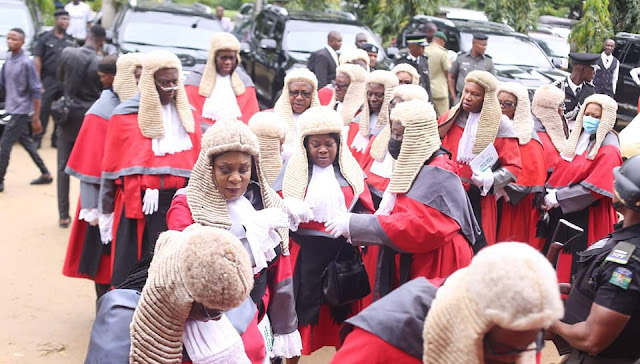A storm of criticism has erupted over the composition of the recently announced Presidential Committee on the 2025 National Population and Housing Census, with the apex body of Igbo lawyers, Otu Oka-Iwu, voicing strong condemnation over what it terms the blatant exclusion of the South-East and South-South geopolitical zones.
This reaction comes amid growing concerns from civil society groups and regional stakeholders who are questioning the integrity and national representativeness of the committee tasked with overseeing a process considered critical to Nigeria’s development trajectory.
Speaking through a strongly worded statement signed by its President, Mazi Okechukwu Unegbu, and Secretary, Chief Ben Ihesiulo, the group expressed “utter disappointment, deep concern, and unreserved condemnation” at what it described as the Federal Government’s continued marginalisation of key regions in national affairs.
A breakdown of the committee’s membership reveals that out of the seven individuals appointed, five hail from the South-West region, with the remaining two drawn from the North-Central and North-West zones. Noticeably absent are any representatives from the South-East or South-South, a decision Otu Oka-Iwu has branded as neither accidental nor administrative oversight, but a deliberate and calculated affront to principles of national inclusion.
“This is not just an omission; this is a clear and calculated act of marginalisation,” the statement read. “It reinforces the entrenched and widening pattern of exclusion and systemic discrimination against the Igbo people and our neighbours in the South-South region.”
The group minced no words in describing the gravity of the issue, stressing that a national census is not merely a technical or statistical exercise. Rather, it is a deeply political and economic mechanism, shaping the very structure of Nigeria’s future — from political representation to budget allocations and development initiatives.
At the heart of Otu Oka-Iwu’s grievance lies the fundamental concern over equity, justice, and adherence to constitutional values. The Federal Character Principle, enshrined in the Nigerian Constitution, demands equitable representation of all regions in federal appointments. According to the group, this latest development amounts to a direct violation of those principles.
“A national census defines who counts and who is counted,” the statement emphasized. “To deliberately exclude entire geopolitical zones from the national census committee is to say, unequivocally, that our people do not matter.”
The group warned that allowing the committee to proceed in its current form threatens not only the credibility of the 2025 Census but also the fragile unity of the Nigerian federation. Citing historical grievances and a pattern of systemic exclusion, the lawyers issued a call for urgent corrective measures.
The group’s demands include the immediate reconstitution of the Presidential Census Committee to reflect a more balanced and inclusive structure that gives adequate representation to all six geopolitical zones, particularly the South-East and South-South.
Failure to do so, Otu Oka-Iwu cautioned, could spark widespread opposition to the census process. “We will not hesitate to mobilise our people across Igbo land and the South-South to resist and reject any enumeration or census process carried out under such a flawed and exclusionary framework.”
Beyond legal and political pressure, the group is also calling on influential institutions within and outside the country to intervene. Traditional rulers, civil society organisations, religious bodies, and even the international community were urged to raise their voices against what the lawyers have described as a “grievous error.”
“We cannot, and will not, be spectators in our own country,” the lawyers declared.
The statement closed with a stern reminder that Nigeria’s unity and peace depend on fairness, justice, and inclusion. “The unity of Nigeria cannot be built on selective inclusion and calculated injustice. There can be no peace where there is no justice.”
With tensions already running high over national issues such as resource control, restructuring, and regional development imbalances, this controversy over census committee representation is poised to ignite further debate. As the nation inches closer to the 2025 census, the Federal Government faces mounting pressure to address concerns over fairness and transparency or risk undermining the legitimacy of one of its most important civic exercises.
Whether the Presidency will heed the call to review the committee’s composition remains to be seen. What is clear, however, is that the storm stirred by this latest appointment has reawakened deep-seated grievances about representation, equity, and the true meaning of nationhood in Nigeria.













![Content Creator Angelica Kelechi Speaks Out on Alleged Sexual Assault at Khloe Abiri’s Spa [VIDEO]](https://blogger.googleusercontent.com/img/b/R29vZ2xl/AVvXsEgQStip4cn2DAOvQ2hNFU30OAFWoxfQIDOnStd0uVgwwxKrFAQYYvtFni6QV04OGP8dyKk5TCAhXM5es9linl1ClhjPzaazz2tTt0LmJ5lFVe5202o2McF9QROT1v2hEyNTdY-M1KRuLTY6OqqysKNfcsY5bCtwCIP8wEQ4AXcfQfTaXWWZiixqf82NDH5a/w72-h72-p-k-no-nu/abiri-khloe123.jpg)






0 Comments
Hey there! We love hearing from you. Feel free to share your thoughts, ask questions, or add to the conversation. Just keep it respectful, relevant, and free from spam. Let’s keep this space welcoming for everyone. Thanks for being part of the discussion! 😊